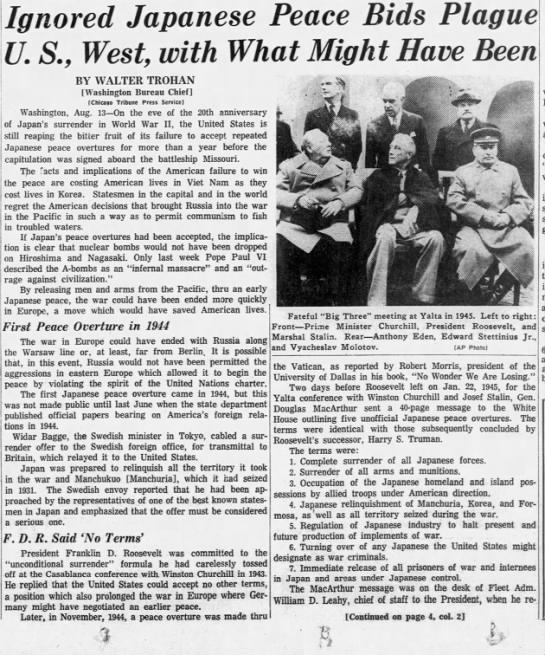Americans need to come to the realization that the bombings of civilians was really mass murder, not unlike what Nazi Germany and Imperial Japan were guilty of.
Great column on the subject.
The Atomic Bombing of Japan, Reconsidered
By Alan Mosley
Mises.org
January 2, 2019
Russia’s move, in fact, compelled the Japanese to consider unconditional surrender; until then, they were only open to a conditional surrender that left their Emperor Hirohito some dignity and protections from war-crimes trials. Ward concludes that, as in the European theatre, Truman didn’t beat Japan; Stalin did.
Harry Truman never expressed regret publicly over his decision to use the atomic bombs. However, he did order an independent study on the state of the war effort leading up to August of 1945, and the strategic value of the Hiroshima and Nagasaki bombings. In 1946, the U.S. Bombing Survey published its findings, which concluded as follows: “Based on a detailed investigation of all the facts and supported by the testimony of the surviving Japanese leaders involved, it is the Survey’s opinion that certainly prior to 31 December 1945 and in all probability prior to 1 November 1945, Japan would have surrendered even if the atomic bombs had not been dropped, even if Russia had not entered the war, and even if no invasion had been planned or contemplated.” This is an intensive condemnation of Truman’s decision, seeing as Russia did enter the war, and that plans for an invasion had been developed.
As Timothy P. Carney writesfor the Washington Examiner, the fog of war can be a tricky thing. But if we’re forced to side with Truman, or Eisenhower and the other dissenting military leaders, the Eisenhower position isn’t merely valid; it actually aligns better with some fundamental American values. Given all the uncertainty, both at the time and with modern historical revisionism, it’s better to look to principle rather than fortune-telling. One principle that should be near the top of everyone’s list is this: it’s wrong to target civilians with weapons of mass destruction. The deliberate killing of innocent men, women, and children by the hundreds of thousandscannot be justified under any circumstances, much less the ambiguous ones Truman encountered. Whether his decision was motivated by indignation toward Japanese “ pigheadedness” or concern for his troops, Truman’s use of such devastating weapons against non-combatants should not be excused. Americans must strive for complete and honest analysis of the past (and present) conflicts. And if she is to remain true to her own ideals, America must strive for more noble and moral ends—in all conflicts, domestic and foreign—guided by our most cherished first principles, such as the Golden Rule. At the very least, Americans should not try so hard to justify mass murder.
The Atomic Bombing of Japan - LewRockwell LewRockwell.com
That is a poor one sided article.
Truman correctly surmised that Japan was going to never surrender in battle. Indeed, they would have fought all the way to the last soldier alive. And the Japanese Army was way-way better led and organized than the Nazis. And very dug in.
When Truman got the numbers of assumed dead... it was a no brainer.
It was the right decision then, and still is.

